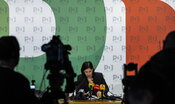Strengthen the Democratic Party without ‘cannibalizing’ allies. The task facing the Democratic secretary is anything but simple. Elly Schlein waited thirty-six hours before appearing at a press conference to comment the regional wins in Umbria and Emilia-Romagna. A step that restored the image of a healthy Democratic Party as it hadn’t been for years. The numbers crunched say that the Dems grow by 8 points compared to the previous regional ones, by 7 compared to the European ones, by 15 on the latest policies. The other side of the coin is that the allied parties, led by the 5 Star Movement, see their consensus erode with each electoral step. The Five Star Movement stopped below 5 percent, the Greens and Left Alliance, which had also reached double figures in the European elections, stopped just above 6 percent, the centrists are below the 3 percent threshold. Not much to hope to contest the government from the right.
Prodi’s point of view
The first to realize this was Romano Prodi, who knows something about fragile coalitions: exactly twenty years ago, on 11 October 2004, the professor inaugurated the Grand Democratic Alliance, renamed a few months later L’Unione, with which he arrived at Palazzo Chigi in 2006 and stayed there for two years. Strengthened by those years ‘lived dangerously’, between votes of confidence hanging by a thread, thrusts between reluctant allies and threats of resignation, Prodi offers a couple of pieces of advice to the dem leader. The first is to “equip ourselves with reform programs” that can hold together the various souls of the future national coalition. The second piece of advice is to don’t forget the moderate electorate, “without whom you won’t win”. The Democratic secretary, up to now, has made it a rule not to “waste even a minute in internal controversies”. Rule followed to the letter even after its opening to Matteo Renzi, followed by the ‘niet’ of the 5 Star Movement and the Green and Left Alliance. “It’s not up to me to tell others what to do. It’s up to me to mediate,” the secretary says today. Schlein is aware that “having solid allies is in the interest of the Democratic party” and seems to take Prodi’s advice when he announces that “the mobilization for healthcare will continue”, but will also be accompanied “by a proposal for a reform overall of the sector”.
Words that arrived while the demonstration of healthcare workers, doctors and nurses was underway in Piazza Santi Apostoli, a few tens of meters from the Nazarene. It is a point on which Prodi focuses during an interview: “The battle on healthcare financing is right and proper, but the opposition must say what they think, for example, about family doctors or about what they want to do on the model organizational. The Democratic Party has the duty to propose active policies”.
Elly Schlein’s programs
Schlein’s idea is to propose an overall reform of the sector that goes in the direction of “proximity healthcare, which arrives close to people’s homes. The public health campaign is therefore intertwined with our mobilization in internal areas, to pay doctors, nurses and even teachers better.” However, it is not just the issue of healthcare that holds the opposition together. The ‘pillars’ on which to build a coalition that “can send the right home” pass through the themes that led to the victory on 17 and 18 November: “Healthcare, school, work, industrial policies, climate and rights. Five things on which there is already convergence”. In short, for Schlein “we are not starting from scratch”. A work that also passes through Parliament, with the common battle of the opposition on the “minimum wage”. Among the amendments reported to the law of budget also features one of the oppositions that asks for workers to be paid sufficient and proportionate to the quantity and quality of the work performed, i.e. the minimum wage is signed, among others, by the opposition leaders Giuseppe Conte, Nicola Fratoianni, Matthew Richetti, Elly Schlein, Angelo Bonelli and Riccardo Magi.
Given the internal hostilities within the progressive camp, which manifested themselves again a few hours after the vote, the path appears long. But Schlein and his allies have time to try. The political elections, barring surprises, are two years away and first there will be tests in the six regions up for vote in 2025: Valle D’Aosta, Veneto, Tuscany, Marche, Campania and Puglia. Elections in which Schlein will arrive with the wind in his sails, as a dem in Transatlantic bets. The reasoning is that the secretary will have the opportunity to prepare the campaign with a Democratic Party pacified by victories and the growth of consensus. Tuscany and Puglia, where the Dems govern, can be easily confirmed, if the candidates are not mistaken. The big question mark is, however, Campania with the unknown De Luca. The governor has already made it known that he intends to run, openly challenging Schlein who, instead, wants to keep the bar straight on the two-term limit. Even more so after having received the green light from the Regional Council for the third mandate. A nightmare scenario for the Democratic Party which could mark the definitive break from Vincenzo De Luca who, by siding against the PD candidate, could be expelled from the party. Meanwhile, Schlein can enjoy the election of Gaetano Manfredi as president of the ANCI. The mayor of Naples, it is reported, was the first choice of the secretary who worked personally by keeping the mayors together and closing the agreement on the mayor of Naples.
